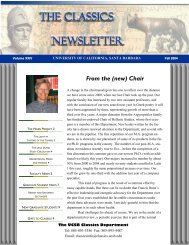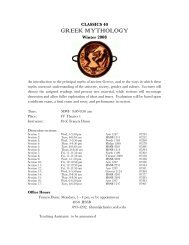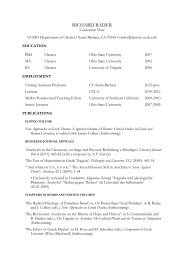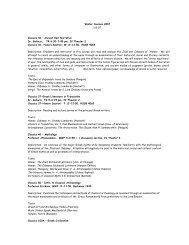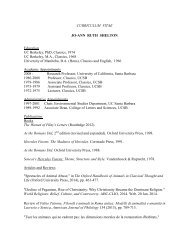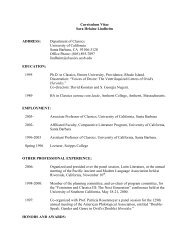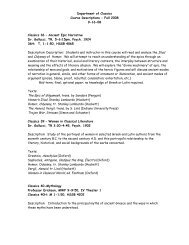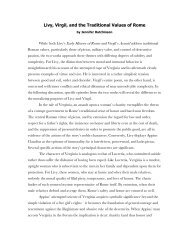Department of Classics - University of California, Santa Barbara
Department of Classics - University of California, Santa Barbara
Department of Classics - University of California, Santa Barbara
You also want an ePaper? Increase the reach of your titles
YUMPU automatically turns print PDFs into web optimized ePapers that Google loves.
Page 1<br />
Volume XXV<br />
UNIVERSITY OF CALIFORNIA, SANTA BARBARA Fall 2005<br />
Letter from the Chair<br />
Voula Aldrich, Four Seasons in <strong>Santa</strong><br />
<strong>Barbara</strong> Watercolor collage, 1982<br />
GREEK SUMMER PROGRAM 2005<br />
2<br />
IMAGINES OF UCSB<br />
4<br />
DEPARTMENTAL PRIZES<br />
AND AWARDS 5<br />
FACULTY NEWS<br />
5<br />
GRADUATE STUDENT NEWS<br />
6<br />
RECENT AND UPCOMING<br />
LECTURES 8<br />
VOULA ALDRICH<br />
8<br />
NEW GRADUATE STUDENTS<br />
9<br />
GIFTS TO CLASSICS<br />
9<br />
This was an important year for the <strong>Department</strong>. Every decade or so, each<br />
department at UCSB undergoes a rigorous review process, in which a bewildering<br />
variety <strong>of</strong> campus <strong>of</strong>ficers and committees assesses virtually every aspect<br />
<strong>of</strong> our undergraduate and graduate programs with the expert advice <strong>of</strong><br />
an External Review Committee made up <strong>of</strong> three leading scholars in the discipline.<br />
No stone went unturned in this effort, and the result was a rather exhausting<br />
year; the <strong>Department</strong>’s students and faculty became quite used to<br />
the bright but salutary glare <strong>of</strong> publicity as we prepared the many written<br />
documents and attended the many meetings demanded by the process. But I<br />
am pleased to say that when the dust had finally settled, it turned out that we<br />
had done very well. The faculty’s research was commended, our teaching (by<br />
faculty and graduate students alike) lauded, the <strong>Department</strong>’s “climate” found<br />
to be friendly and supportive, our important place in the <strong>University</strong>’s broad<br />
educational mission affirmed. We can all take pride in the steady rise in appreciation<br />
<strong>of</strong> our programs both within the <strong>University</strong> and nationwide.<br />
Any such assessment <strong>of</strong> course points up areas where we have more work to<br />
do—work that we have already begun. This fall we initiated a new, intradepartmental<br />
research forum, the Lunch-Hour Colloquium (suggestions for a<br />
more glamorous name are welcome!) with three presentations, two by faculty<br />
members (Pr<strong>of</strong>s. Dunn and Dutsch) and one by our most recent Ph.D.,<br />
Dr. Benjamin M. Wolkow. Colloquia will continue throughout the year, <strong>of</strong>fering<br />
an opportunity for us to share results <strong>of</strong> current research and to engage<br />
graduate students as well as faculty members in a more vibrant intellectual<br />
community. Reviewers also suggested that we develop further our current<br />
Teaching-Assistant Training Program, which we are now in the process <strong>of</strong><br />
doing. A more controversial matter is the question whether we should lower<br />
our relatively high Classical language requirement for our undergraduate Civilization<br />
and Archaeology tracks, or even (as some campuses have done) drop<br />
it entirely. We have started our research by gathering data from other large,<br />
public universities; a committee will study the matter through the year with<br />
The UCSB <strong>Classics</strong> <strong>Department</strong><br />
Tel: 805-893-3556 Fax: 805-893-4487<br />
Email: classicsinfo@classics.ucsb.edu<br />
(Continued on page 2)
Fall 2005<br />
<strong>Department</strong> <strong>of</strong> <strong>Classics</strong> Page 2<br />
(Continued from page 1)<br />
an eye to making a recommendation<br />
to the <strong>Department</strong><br />
in May. (Any readers<br />
who have strong views on<br />
these matters are very welcome<br />
to make them known<br />
to me.)<br />
Our undergraduate program<br />
is certainly in robust health,<br />
to judge from our rapidly<br />
rising number <strong>of</strong> majors. I am<br />
happy to report that we are<br />
up to nearly 50—an increase<br />
<strong>of</strong> nearly 2/3 over the last five<br />
years! As we look forward, it<br />
is clear that our greatest challenge<br />
is to develop further<br />
our PhD program while maintaining<br />
the high standing that<br />
our MA program enjoys nationwide.<br />
I see no contradiction<br />
between these goals either<br />
at the curricular or funding<br />
level. The new research<br />
colloquium should help draw<br />
departmental attention toward<br />
our scholarly achievements,<br />
while the new position<br />
in Greek literature for which<br />
we are hiring this year will—<br />
together with our two successful<br />
new hires over the<br />
past four years—add valuable<br />
“new blood” to our teaching<br />
and scholarship. The research<br />
programs <strong>of</strong> a number <strong>of</strong> our<br />
faculty are coming to fruition.<br />
There are good grounds for<br />
optimism as we look toward<br />
the next “review cycle” in<br />
this <strong>Department</strong>’s life.<br />
Robert Morstein-Marx<br />
Greek Summer Program 2005<br />
Apostolos Athanassakis and B. Erickson<br />
In the morning <strong>of</strong> June 19, we were all assembled in Athens and went on a magnificent<br />
walking tour <strong>of</strong> Europe’s oldest cities. Classes started immediately on<br />
the following day. The pace was demanding, but the students were excited and<br />
learned a great deal from their visits to the ancient sites. At the Agora, John<br />
Camp, director <strong>of</strong> the excavations, gave an unforgettable presentation on the<br />
commercial and political heart <strong>of</strong> ancient Athens. The students also visited the<br />
great museums and they were taught on-site at Brauron, Sunion, and Marathon.<br />
On July 2, the group divided in half for the next stage <strong>of</strong> the program: a month<br />
<strong>of</strong> classes on a Greek island, with Pr<strong>of</strong>. Athanassakis leading the group bound<br />
for Paros and Pr<strong>of</strong>. Erickson at the head <strong>of</strong> the expedition to Crete.<br />
The Parian group sailed the broad back <strong>of</strong> the sea on a great boat. As the color<br />
<strong>of</strong> the sea and the color <strong>of</strong> the sky blended into a blue composition, the bonedry<br />
islands danced all about them. After landing on Paros, the group formed a<br />
procession to their new home, the Aegean Village. Pr<strong>of</strong>essor Dmitrios Skilardi,<br />
Director <strong>of</strong> Excavations at Paros, taught the archaeology <strong>of</strong> Paros and the Cyclades,<br />
while Pr<strong>of</strong>. Athanassakis taught the history <strong>of</strong> women in Classical antiq-<br />
(Continued on page 3)
Fall 2005<br />
<strong>University</strong> <strong>of</strong> <strong>California</strong>, <strong>Santa</strong> <strong>Barbara</strong> Page 3<br />
(Continued from page 2)<br />
uity. The archaeological museum was very close to the Aegean Village, and we paid it<br />
frequent visits. The students were also immersed in modern Greek life. At the local<br />
folk museum, we were treated to a combination <strong>of</strong> instruction and Parian hospitality.<br />
The mayor <strong>of</strong> Paros allowed us to use the city's magnificent conference room as our<br />
classroom. Also, our landlord gave us two beautiful receptions, complete with live<br />
music and delectable food. It was not easy to see the students <strong>of</strong>f at the harbor.<br />
Also unforgettable was the other group’s journey to Crete. We stayed at a charming<br />
seaside town, Rethymno, with a rich history as a Venetian and Ottoman port. This<br />
was our base <strong>of</strong> operations, and we traveled far and wide across the island, visiting<br />
ancient sites and learning about the history <strong>of</strong> one <strong>of</strong> the oldest and richest civilizations<br />
in the Mediterranean world. Students took classes on the archaeology <strong>of</strong> Crete<br />
and Greek painting. The mayor <strong>of</strong> Rethymno provided us with a classroom to delve<br />
into archaeological and historical topics and prepare for our trips. Most <strong>of</strong> the time,<br />
the island itself served as our classroom. Students will never forget the strong smell<br />
<strong>of</strong> herbs as they hiked through the bramble in the clear mountain air on the way to<br />
some remote site. In the picture at left you see us gathered atop a 2,000-year old<br />
bridge at Eleutherna, one <strong>of</strong> the island’s most powerful ancient cities. It is now almost<br />
inaccessible except to the most devoted students <strong>of</strong> archaeology. We also visited<br />
the ruins <strong>of</strong> Knossos and other rich Bronze Age palaces. What we learned in<br />
the classroom the sites made real and tangible. Under our watchful eye, archaeologists<br />
went about their work and brought to light objects from sites abandoned centuries<br />
ago. The joys <strong>of</strong> modern Greek life were also part <strong>of</strong> what drew us to Crete.<br />
Students picked up Greek phrases, spent time at the local markets, and enjoyed the<br />
local lyre players’ songs. It was an unforgettable experience.<br />
Children Singing<br />
Greek Mandolino<br />
ink on paper, 1966<br />
Listen to your own beat<br />
Linocut, 1972
Fall 2005<br />
<strong>Department</strong> <strong>of</strong> <strong>Classics</strong><br />
Page 4<br />
Imagines <strong>of</strong> UCSB<br />
Pr<strong>of</strong>essor Walter Englert<br />
Reed College<br />
MA UCSB ‘76<br />
Epicurus founded his philosophical school, called the Garden, in Athens at the<br />
end <strong>of</strong> the 4 th cent. BCE. He designed it to be a place where students could<br />
study, become friends, and change their lives. Like the ancient Garden, modern<br />
academic institutions can be life-changing places. If we are lucky, when we<br />
are students they challenge us, encourage us, and make us grow intellectually<br />
and emotionally. If we are even luckier, and become teachers ourselves, the<br />
schools we studied at provide us with models <strong>of</strong> scholarship and teaching that<br />
last a lifetime. UCSB was such a place for me. I came to the <strong>Classics</strong> <strong>Department</strong><br />
at UCSB in fall 1974, fresh from my undergraduate experience as a double<br />
major (<strong>Classics</strong> and Integral Liberal Arts) from St. Mary’s College <strong>of</strong> <strong>California</strong>. I knew<br />
that I loved reading Latin and Greek, but had only the vaguest notion about the wider field <strong>of</strong><br />
<strong>Classics</strong> or what a career in <strong>Classics</strong> might involve. The <strong>Classics</strong> department at UCSB<br />
changed all that.<br />
The <strong>Classics</strong> program at UCSB provided me with standards <strong>of</strong> scholarship and teaching that<br />
are still alive for me today. I took a number <strong>of</strong> excellent seminars, including courses on Plato’s<br />
Symposium and Pindar with David Young, Lucretius with Jo-Ann Shelton, Greek epigraphy with<br />
Borimir Jordon, Comparative Greek and Latin morphology with Apostolos Athanassakis,<br />
Propertius with Alva Bennett, Theocritus with Keith Aldrich, Tacitus with Michael Grant, Aristotle’s<br />
Poetics with H.D.F. Kitto, and Roman History with Hal Drake. I learned a lot about<br />
the authors and works we studied in each course, and what it meant to be scholar and<br />
teacher. I learned how to read an author closely, how to pose interesting questions about<br />
them, how to research a topic, and how to write critically. Just as importantly, though, I<br />
learned what a complex thing “good teaching” is. My pr<strong>of</strong>essors at UCSB made it clear that<br />
good teaching requires more than just knowing one’s scholarly specialty and field well. Perhaps<br />
appropriately, the only word I can find that adequately describes what I felt from the<br />
UCSB <strong>Classics</strong> faculty is a Latin one: humanitas.<br />
Youth singing<br />
(after an image on an ancient<br />
Greek Vase), 1972<br />
It is this combination <strong>of</strong> knowledge, teaching ability, and humanitas that inspired me to go on<br />
in <strong>Classics</strong>. My work at UCSB made prepared me to earn a Ph.D. in <strong>Classics</strong> at Stanford, and<br />
then teach, first for a year at the <strong>University</strong> <strong>of</strong> Michigan, and then at Reed College, where I<br />
have been for 25 years. The lessons I learned from my teachers at UCSB are still alive today<br />
in my interaction with students inside and outside the classroom, and I try to embody the<br />
humanitas that they demonstrated so memorably to me. Though Portland <strong>of</strong>ten feels very far<br />
geographically from <strong>Santa</strong> <strong>Barbara</strong> (especially in the winter when it is so rainy here in Oregon!),<br />
UCSB is always close to my heart. Epicurus, whom I mentioned earlier, would have<br />
had a ready explanation for this. Memories, he taught, are nothing but atomic images (Gr.<br />
eidôla, Lat. imagines) <strong>of</strong> people and places that fly through the air all around us, and that pass<br />
through our minds as we focus on them when we want to remember something. I feel very<br />
fortunate that the atomic imagines <strong>of</strong> the experiences I had at UCSB in 1974-1976 have made<br />
the 1000-mile journey between Portland and <strong>Santa</strong> <strong>Barbara</strong> and are still in the air flying<br />
around me so that I can continue to focus on them. They continue to be a source <strong>of</strong> great<br />
inspiration and joy.
Fall 2005<br />
<strong>University</strong> <strong>of</strong> <strong>California</strong>, <strong>Santa</strong> <strong>Barbara</strong><br />
Page 5<br />
Faculty News<br />
Apostolos Athanassakis writes: “Just as I was leaving for Greece back in June, I received<br />
a copy <strong>of</strong> my article ‘Akhilleus's Horse Balios: Old and New Etymologies.’ I<br />
was so very happy to see my article in Glotta, but here is a detail I want to share with<br />
everybody. The <strong>of</strong>ficial date <strong>of</strong> publication date given is 2002; the actual date <strong>of</strong> publication<br />
is 2005. Clearly, Glotta is not a journal to send articles which must be published<br />
with some urgency. It was not so easy to teach Summer School and write.<br />
However, a translation <strong>of</strong> the life <strong>of</strong> Saint Paisios, which I am doing with the Reverend<br />
Dr. Tim Vivian, is perhaps in the final stage. Since our students will read this letter, I<br />
want to mention that some <strong>of</strong> the lives <strong>of</strong> the Saints contain precious references to<br />
culture in the very late Roman Empire. During the second half <strong>of</strong> the Summer, I<br />
stayed with my parents. Our house is like a monastery lost in the woods. It is a beautiful<br />
place for reading and writing, a true secessus. By the time I left, I finished the written<br />
version <strong>of</strong> my article on the catalogues <strong>of</strong> Homer and Hesiod. I am about to send<br />
this article to Greece for publication. During the Summer, Dr. Theony Condos translated<br />
a rather sizable collection <strong>of</strong> my poems. It is rather early for me to say anything<br />
about this. On a more exciting note, in mid-November, I went to Finland to give a<br />
paper at a conference held at the <strong>University</strong> <strong>of</strong> Turku. The subject <strong>of</strong> the conference<br />
was ‘The Bear as a Sacrificial Animal and a Constellation.’ My talk covered the Greek<br />
side.”<br />
Francis Dunn reports that he spent the spring and summer getting reacquainted with<br />
his bicycle after years <strong>of</strong> separation; no saddle sores yet, just sore legs. During the<br />
same period three articles made their way into print: “Narrative, Responsibility, Realism”<br />
in The Bakhtin Circle and Ancient Narrative (Groningen), “On Ancient Medicine<br />
and its intellectual context” in Hippocrates in Context (Leiden), and “Trope and Setting<br />
in Electra” in Sophocles and the Greek Language (Leiden). And he is happy to report<br />
that the long-awaited feature-length movie created by his sons, The Twilight <strong>of</strong> Troy, had<br />
its world premiere this summer at Embarcadero Hall.<br />
Dorota Dutsch writes: “As everyone knows, I spend my days tending to the infamous<br />
‘book monster.’ It now has grown to ten chapters, but still requires a huge amount <strong>of</strong><br />
grooming. A <strong>University</strong> Press (I will not name it to avoid bad luck!) expressed interest<br />
in the project so there is some hope that one day I will be free. Meanwhile two other<br />
texts I have produced have been accepted for publication: a short article on Plautus’<br />
Miles, subtitled “On Mice and Vampires,” will be forthcoming in Mnemosyne; an entry<br />
on Virgil’s Eclogues will appear in the <strong>Classics</strong> volume <strong>of</strong> an award-winning series entitled<br />
World Literature and its Times. Two more, an article on gesture in the Parisian<br />
manuscript <strong>of</strong> Terence and an essay on the Latin dirge, are currently under review.<br />
And there is theater. Last spring, I had the chance to stage Aristophanes’ Thesmophoriazousai<br />
with a wonderful group <strong>of</strong> students from the College <strong>of</strong> Creative Studies.<br />
(Many thanks to the generous souls who sat through our eccentric performance and<br />
laughed at the right moments!) Now the time has come to stage a classical play in the<br />
original language. Latin 114/214 (we will be reading Plautus’ Casina this year) seems the<br />
perfect opportunity to enlist a cast <strong>of</strong> readers who will recite the Latin as the saltatores<br />
mime the action. I hope I can count on your support!”<br />
<strong>Department</strong>al Prizes and<br />
Awards for 2004-2005:<br />
Keith Aldrich Memorial Awards<br />
for outstanding academic<br />
achievement in <strong>Classics</strong><br />
Christine Maisto<br />
(Graduate)<br />
Christopher King<br />
(Undergraduate)<br />
Nicholas and Lena Dumas Prizes<br />
for outstanding essay in Greek<br />
mythology<br />
Patricia Bobek<br />
(Fall ’04)<br />
Alexia Ferracuti<br />
(Winter ’05)<br />
Nicholas and Lena Dumas Travel<br />
Scholarship for study <strong>of</strong> Greek<br />
antiquities<br />
Charlene C. Clingman<br />
Isla Vista<br />
Linocut, 1979<br />
(Continued on page 6)
Fall 2005<br />
<strong>Department</strong> <strong>of</strong> <strong>Classics</strong><br />
Page 6<br />
(Faculty News, continued from page 5)<br />
Portrait <strong>of</strong> a girl<br />
Charcoal on paper, ca. 1970<br />
Graduate Student News<br />
Congratulations are in order<br />
to our newest Ph.D., Benjamin<br />
M. Wolkow, who defended<br />
his dissertation on<br />
Pratinas <strong>of</strong> Phlius in December;<br />
and to Daniel Hu, who<br />
passed his final qualifying<br />
exam for the PhD at the end<br />
<strong>of</strong> November. Daniel plans to<br />
write his dissertation on the<br />
style <strong>of</strong> Aeschylus.<br />
Tracy Jamison writes that<br />
over the last year she gave a<br />
paper on “Literature in Art:<br />
Reflections on South Italian<br />
Vase Paintings” at the meeting<br />
(Continued on page 7)<br />
“Rebetika performer”<br />
Linocut, 1978<br />
Brice Erickson has had a busy year.<br />
When he arrived at UCSB, Brice revised<br />
the archaeology program, and this year<br />
will see the debut <strong>of</strong> the last <strong>of</strong> a new set<br />
<strong>of</strong> archaeology courses, Greek Painting<br />
(<strong>Classics</strong> 165). Students in all archaeology<br />
classes now have the benefit <strong>of</strong> a<br />
rich study collection <strong>of</strong> Greek and Roman<br />
antiquities, a recent donation to the<br />
<strong>Department</strong> by Mrs. Lena Dumas (see<br />
the Fall 2004 Newsletter). On the research<br />
front, Brice’s book on Late Archaic<br />
and Classical Cretan archaeology and<br />
Children playing the flute<br />
Linocut, 1979<br />
history is nearing the final editing phases.<br />
This book establishes the first chronological sequences <strong>of</strong> pottery for the island from<br />
600 to 400 B.C. and draws historical conclusions from this evidence. During these periods,<br />
Crete aligned itself through trade routes and cultural connections with the conservative<br />
Dorian societies <strong>of</strong> southern Greece. In addition, an article on the impact <strong>of</strong> the<br />
Athenian empire on Cretan trade ca. 450 B.C. has come out in the November 2005 issue<br />
<strong>of</strong> the American Journal <strong>of</strong> Archaeology. Over the summer, Brice led the Crete component<br />
<strong>of</strong> the UCSB study abroad program on Crete (see article, p.2). This program<br />
enlisted a record 48 students, who divided their time between Athens and a Greek island.<br />
Also, Brice’s field study <strong>of</strong> Early Iron Age material (ca. 900 to 300 B.C.) from<br />
Lerna, a coastal village on the edge <strong>of</strong> the Argive plain in mainland Greece, is proceeding<br />
as planned, and this will be his next book project.<br />
Ralph Gallucci received a non-Academic Senate Pr<strong>of</strong>essional Development Grant to<br />
deliver a paper, “The Oligarchic Government That Never Was: Athens 411/10 B.C.,”<br />
in Athens Greece on December 28 at the 3rd International Conference on European<br />
History. In addition, Ralph completed his second summer as Director <strong>of</strong> the Freshman<br />
Summer Start Program (FSSP), which now brings some 285 new first year students to<br />
campus for Summer Session B to get an early start academically and to enhance their<br />
transition to UCSB. This past summer Jo-Ann Shelton taught a Freshman Seminar<br />
(Animals in Antiquity) for the Program; Dorota Dutsch taught Cookery and Nutrition in<br />
Antiquity the previous summer. Dr. Gallucci and William Jankowski were awarded a<br />
Theresa Neil Memorial Research Grant from the AUSS, NAASS, NCCSS, and WASSA<br />
Research Consortium to evaluate the Program’s effects on such issues as grade point<br />
average, student retention, time to degree, grades, and involvement in undergraduate<br />
research.<br />
This summer Frances Hahn produced a chapter entitled ‘Performing the Sacred:<br />
Prayers and Hymns’ for the Blackwell Companion to Roman Religion. In addition to providing<br />
an introduction to the style, characteristics, and political significance <strong>of</strong> prayer in ancient<br />
Rome, the chapter examines the ancient emphasis on the power <strong>of</strong> prayer language<br />
with insights gained from studies in performance and ritual. Through the fall quarter,<br />
(Continued on page 7)
Fall 2005<br />
<strong>University</strong> <strong>of</strong> <strong>California</strong>, <strong>Santa</strong> <strong>Barbara</strong><br />
Page 7<br />
(Faculty News continued from page 6)<br />
Pr<strong>of</strong>essor Hahn hid in her home and department <strong>of</strong>fice writing the introductory and concluding<br />
chapters to her book on rituals <strong>of</strong> thanksgiving, with the support <strong>of</strong> the Interdisciplinary<br />
Humanities Center.<br />
Borimir Jordan refereed a proposal for a book on religion and mythology submitted to<br />
Oxford <strong>University</strong> Press (the Clarendon Press in England, he notes, not the one in New<br />
York) by a scholar at Oxford <strong>University</strong>. He also reviewed a book, Seafaring in the Ancient<br />
Mediterranean by A. Tilley for the Mariner's Mirror, an English scholarly journal about seafaring.<br />
Sara Lindheim reports, “In February I got my first dose <strong>of</strong> east coast winter in about seven<br />
years. I was reacquainted with my long winter coat, with snow, and with slowly losing all<br />
feeling in my fingers and toes. The purpose <strong>of</strong> my trip to the land <strong>of</strong> snow and ice was to<br />
give a paper at Yale <strong>University</strong> in a colloquium about gender in Ovid. My paper, entitled<br />
‘Terminal Anxiety: Exploring the Boundaries <strong>of</strong> Gender and Empire in Ovid's Metamorphoses,’<br />
marks the beginning <strong>of</strong> my new research project on the changing conception <strong>of</strong><br />
physical, imperial space in the Augustan Age and how the poetry <strong>of</strong> the period figures the<br />
new ways <strong>of</strong> thinking about space so clear in political, social and cultural discourses. It was<br />
much warmer in November at Pepperdine (in Malibu), where I delivered another talk on a<br />
similar topic at the meeting <strong>of</strong> the Pacific Ancient and Modern Language Association, this one<br />
entitled ‘Imperium Sine Fine: (Un)limited Gender and Empire in Ovid's Metamorphoses.’<br />
Robert Morstein-Marx is too busy with departmental business to have very much to report.<br />
However, his Blackwell Companion to the Roman Republic (co-edited with Nathan<br />
Rosenstein) is in production and slated for publication in 2006. In November he gave a lecture<br />
entitled “Was Roman Voting a Consensus Ritual?” at New York <strong>University</strong>’s 2005<br />
Ranieri Colloquium on “Conditions <strong>of</strong> Democracy: Ancient Mesopotamia to Modern Iraq.”<br />
He hopes to publish a version <strong>of</strong> this piece somewhere and also to write up an earlier lecture,<br />
“Place, Monument, Memory: The Problem <strong>of</strong> the Gracchi.”<br />
Robert Renehan writes: “I am working on a paper on the Greek novelists (where good<br />
work continues to appear; B. P. Reardon's excellent edition <strong>of</strong> Chariton is now out and J.<br />
N. O'Sullivan's Xenophon Ephesius is due to appear anytime now, both from Teubner). But<br />
I am chiefly occupied, when time permits, with preparing a copy-ready version <strong>of</strong> my collected<br />
writings on the early Greek poets and on Greek philosophy for publication by Teubner.<br />
I am being enormously assisted in this tedious task by the splendid efforts <strong>of</strong> Ben<br />
Wolkow who can make computers dance. And oh yes — I have taught my five-year-old<br />
grandson, as I taught his uncles before him, to say his first Latin words: rex montis sum. (Yes,<br />
in his mother's case it was regina montis sum.)”<br />
Jo-Ann Shelton’s most recent publication is “Putting Women in their Place: Gender, Species,<br />
and Hierarchy in Apuleius' Metamorphoses,” published in Defining Gender and Genre in<br />
Latin Literature, edited by William Batstone and Garth Tissol (Peter Lang, 2005). She taught<br />
a summer freshman seminar on “Animals in Ancient Greece and Rome” and in July attended<br />
the annual meeting <strong>of</strong> ISAZ (International Society for Anthrozoology), where she<br />
gave a paper and chaired a session. She is also pleased to report that she has a new dog.<br />
(Graduate Students News<br />
continued from page 6)<br />
<strong>of</strong> the Classical Association<br />
<strong>of</strong> the Middle West<br />
and South (Southern Section)<br />
at Winston-Salem,<br />
North Carolina, and another<br />
one on “Euripides’<br />
Elegiac Helen” at the Text<br />
and Presentation Comparative<br />
Drama Conference<br />
in Northridge, <strong>California</strong>.<br />
She also gave a<br />
lecture on Modern and<br />
Ancient Greek History at<br />
Antioch <strong>University</strong> in<br />
<strong>Santa</strong> <strong>Barbara</strong>. She is currently<br />
hoping to go to<br />
Greece next year to pursue<br />
a project entitled<br />
“Modern Context, Ancient<br />
Text: Euripidean<br />
Theatre.”<br />
Doug Lucey tells us that<br />
Riley (Batchelder) and he<br />
got engaged this summer<br />
at the Mission “<strong>of</strong> all<br />
places” and are to be wed<br />
next summer in Amesbury,<br />
Massachusetts.<br />
Music in a Taverna<br />
Linocut, 1972
Fall 2005<br />
<strong>Department</strong> <strong>of</strong> <strong>Classics</strong><br />
Page 8<br />
Recent and Upcoming Lectures<br />
Child’s dream<br />
Acrylic on paper, ca. 1967<br />
Voula Aldrich, MA UCSB 1974<br />
This year’s Newsletter is graced by<br />
the artwork <strong>of</strong> Voula Aldrich, a UCSB<br />
alumna whose husband, Keith Aldrich,<br />
was a founding figure <strong>of</strong> this <strong>Department</strong>.<br />
Keith Aldrich’s memory is commemorated<br />
by our annual Aldrich<br />
Awards for outstanding achievement<br />
in <strong>Classics</strong>. Voula arrived here from<br />
her native Greece in 1966 to pursue a<br />
bachelor’s degree in the College <strong>of</strong><br />
Creative Studies, after which she<br />
earned an MA in <strong>Classics</strong> in our young<br />
department. She has remained a warm<br />
and kindly presence in the <strong>Department</strong>,<br />
and recently returned to the<br />
classroom to teach Modern Greek for<br />
us for two years. Only a few <strong>of</strong> us,<br />
however, knew <strong>of</strong> her artistic work,<br />
which she has presented in several<br />
exhibitions. We are very pleased to be<br />
able to decorate the Newsletter with<br />
these remarkable images, many <strong>of</strong><br />
them dating to her student days here,<br />
which will also serve as a reminder <strong>of</strong><br />
the many contributions <strong>of</strong> the Aldrich<br />
Lectures by distinguished visitors enrich our program by bringing fresh perspectives<br />
from outside the <strong>Department</strong> and provoking stimulating conversations<br />
shared by our whole community, faculty, graduate students and undergraduate<br />
majors alike. In 2004-05 we had an unusually busy lecture season. David Konstan<br />
<strong>of</strong> Brown <strong>University</strong> and Stanford’s Center for Advanced Study set the bar<br />
very high at the outset with an excellent paper on “Good Vengeance: Euripides’<br />
Athens and Other Cities.” Jörg Rüpke <strong>of</strong> the <strong>University</strong> <strong>of</strong> Erfurt (Germany)<br />
<strong>of</strong>fered a novel interpretation <strong>of</strong> the Roman triumph in his paper, “Immortality<br />
and Senatorial Control: Statue-rituals in Republican Rome, and the <strong>Classics</strong> <strong>Department</strong><br />
joined with our friends in Philosophy to hear Brad Inwood (<strong>University</strong><br />
<strong>of</strong> Toronto and the Center for Advanced Study, Stanford) talk on “‘Rich Man,<br />
Poor Man:’ the Problems <strong>of</strong> Letter 87 <strong>of</strong> Seneca.” Christopher Pelling, Regius<br />
Pr<strong>of</strong>essor <strong>of</strong> Greek at the <strong>University</strong> <strong>of</strong> Oxford, swung north during a brief visit<br />
to Los Angeles to address us on the subject <strong>of</strong> the varying accounts <strong>of</strong> Caesar’s<br />
assassination. Our two AIA lecturers were Brian Rose <strong>of</strong> the <strong>University</strong> <strong>of</strong> Cincinnati,<br />
who gave the Fourth Annual Sandra Church Lecture on “The Ancient<br />
Greeks in Persia (Iran), Iraq and Afghanistan,” and Jack Davis, also <strong>of</strong> the <strong>University</strong><br />
<strong>of</strong> Cincinnati, who spoke on the Palace <strong>of</strong> Nestor at Pylos. Four excellent<br />
talks by candidates in addition for last year’s Greek Poetry position helped to<br />
make this a particularly exciting year. We owe special thanks to Frances Hahn,<br />
then Chair <strong>of</strong> the lectures committee, and our AIA chapter President Jo-Ann<br />
Shelton, for this extraordinary line-up and for the careful planning that went into<br />
these highly successful events.<br />
This fall we initiated our new Lunch-hour Colloquium with informal presentations<br />
on work in progress by our own faculty and graduate students: this quarter,<br />
Francis Dunn, Dorota Dutsch, and Benjamin Wolkow. The series will continue<br />
through winter and spring. As for visitors from outside, we have already<br />
been honored by the visit <strong>of</strong> this year’s Sather Pr<strong>of</strong>essor at Berkeley, Roger<br />
Bagnall <strong>of</strong> Columbia <strong>University</strong>, who spoke on “Greek and Syriac in the Roman<br />
Near East”; and the Fifth Annual Sandra Church Lecture was delivered in November<br />
by Albert Leonard, Jr. (<strong>University</strong> <strong>of</strong> Arizona) on the subject <strong>of</strong> “Wine-<br />
Making in the Ancient Mediterranean World.” Our second AIA-sponsored visitor<br />
will be Trevor Hodge (Carleton <strong>University</strong>), to lecture in February on<br />
“Massilia, The Oldest City in Western Europe.” Expect a lively winter quarter as<br />
we entertain at least three candidates in our new Greek Literature search, followed<br />
in the spring by an AIA lecture and at least one visitor TBA.<br />
Meditation<br />
Watercolor and collage on paper,<br />
ca. 1983
Fall 2005<br />
<strong>University</strong> <strong>of</strong> <strong>California</strong>, <strong>Santa</strong> <strong>Barbara</strong><br />
Page 9<br />
New Graduate Students<br />
We welcome to the department three new<br />
graduate students:<br />
Jeffery Clackley<br />
<strong>University</strong> <strong>of</strong> Washington<br />
Stan Rauh<br />
GIFTS TO CLASSICS<br />
The <strong>Classics</strong> <strong>Department</strong> is grateful for all gifts, large and small,<br />
that help us in our mission <strong>of</strong> teaching and research, and that promote<br />
the study and understanding <strong>of</strong> the ancient world and the<br />
classical tradition. Donations to the department can help buy<br />
books for our Reading Room, provide fellowships or travel support<br />
for graduate students, or bring distinguished scholars to campus.<br />
We are very grateful for recent gifts from:<br />
<strong>University</strong> <strong>of</strong> Washington<br />
Robert Schwieger<br />
College <strong>of</strong> William and Mary<br />
Mrs. Voula Aldrich<br />
Dr. Noah C. Croy<br />
Mrs. Rosemary A. Lackow<br />
Mr. William Arthur Lockwood, III<br />
Ms. Pamela D. Mays<br />
Ms. Denise E. Morones<br />
Mr. Daniel J. Nelson<br />
Ms. Linda A. S. Poling<br />
Mr. Michael J. Quinette<br />
Mr. Armand R. Ramirez<br />
Mr. John Renehan<br />
Ms. Thorne O. Still<br />
Raytheon Company matching gifts<br />
for Education Programs<br />
Non est ad astra mollis e terris via<br />
-Seneca<br />
...please see over to send us your news!...<br />
STAMP<br />
<strong>Department</strong> <strong>of</strong> <strong>Classics</strong><br />
<strong>University</strong> <strong>of</strong> <strong>California</strong><br />
<strong>Santa</strong> <strong>Barbara</strong>, CA 93106-3120
<strong>Department</strong> <strong>of</strong> <strong>Classics</strong><br />
<strong>University</strong> <strong>of</strong> <strong>California</strong><br />
<strong>Santa</strong> <strong>Barbara</strong>, CA 9 3106-3120<br />
Dear:<br />
LET US HEAR FROM YOU!<br />
We always like to hear from friends and alumni, old and new, near<br />
and far. Please make sure we have your current address, and let us<br />
know what you have been doing. If you are interested (nudge, nudge),<br />
we would love to publish your reflections on "Why I'm glad I studied<br />
<strong>Classics</strong>." And as always, we appreciate your support.<br />
To send us your news, simply detach this last page, fold and tape or<br />
staple with the department address showing, and attach postage.<br />
Thanks!<br />
Name:<br />
Address:<br />
State and zip:<br />
email:<br />
News:<br />
May we publish your news in a future<br />
newsletter?<br />
Yes No<br />
I would like to pledge a donation to the<br />
<strong>Classics</strong> <strong>Department</strong> in the amount<br />
<strong>of</strong>: ____________<br />
Please apply my gift to:<br />
Reading Room<br />
Prizes<br />
Travel Fellowships<br />
Lectures<br />
General Funds<br />
Other: ____________________



